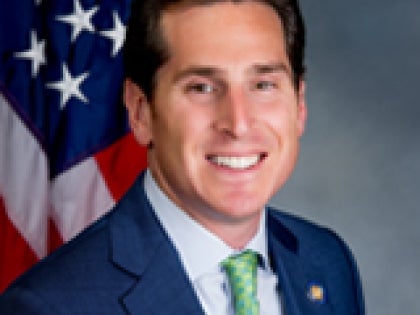
Congestion pricing, LIRR aid moving through state legislature
Assembly Speaker Carl Heastie said Monday a congestion pricing plan for Manhattan is moving through the Legislature and is likely to be approved along with more funding for the Long Island Rail Road.
He also said a final plan likely won't call for double tolls for commuters from Queens and Long Island across the RFK-Triborough Bridge. An earlier proposal by Gov. Andrew M. Cuomo called for a bridge toll and then another for entering Manhattan below 60th Street.
“I’d say after this last conference … it’s safe to say the Assembly is ready to go forward with congestion pricing,” Heastie said after emerging from a closed-door meeting of the Democratic majority.
“We still have to have some details worked out,” Heastie said. “But I wouldn’t say that if I didn’t have the votes.”
That's a notable development in state budget talks because the Democrat-led Assembly initially had presented the strongest opposition to congestion pricing. The program involves charging drivers who enter Manhattan south of 60th Street as a way to fight gridlock and generate money to fix city subways.
Lawmakers are trying to adopt a $175 billion budget by April 1, the start of New York's fiscal year.
Long Island senators had said they would oppose Cuomo's congestion pricing plan unless some of the revenue went toward beefing up the Long Island Rail Road. On Monday, they said the latest version under consideration would direct funds to the LIRR, as well as Metro-North Railroad.
"We made our demands clear," Sen. Todd Kaminsky (D-Long Beach) told Newsday outside the Senate's closed-door meeting. "If there's going to be congestion pricing, we need to make heavy investment in the LIRR."
Kaminsky specifically cited the need to improve the commuter railway's on-time performance. He also warned leaders that funding was needed to address the "transit deserts" on Long Island where residents are served by no public transportation.
"The votes are there for congestion pricing. It will happen," a Senate source said .
Cuomo's office didn't immediately comment Monday.
Heastie wouldn't say how much funding might go to the LIRR and Metro-North. But he said his conference is on board to deliver the funding. He said specific toll amounts weren't final, but there is general agreement on the range.
"We wanted to make sure we wrestled the issue of transit deserts in Long Island, in Westchester and in the outer boroughs and I think we are continuing to work on that," Heastie said.
Heastie said agreements may be final Thursday, which would allow the three days' public review of bills required by the constitution. Voting could occur Sunday, he said.
Several past congestion pricing proposals have failed, dating back to former New York Mayor City Michael Bloomberg's tenure, amid opposition by the outer boroughs and the suburbs. Mayor Bill de Blasio supports Cuomo's proposal.
With the budget deadline looming, the halls of the Capitol on Monday were filled with demonstrators who believe their issue remains unresolved in the budget.
More than 100 union workers demonstrated for legislation to make sure all construction workers on state projects — even when they work for private contractors — are paid the higher “prevailing wage” and benefits like union workers.
Hundreds of service workers filled a large hall adjacent to Cuomo’s office to push for a 2.9 percent cost-of-living increase in the low-paying, high-turnover jobs caring for the disabled, in drug-rehab facilities and in homes for the aging, mentally ill or poor. The latest “Be Fair to Direct Care” demonstration by workers and their clients was one of the larger demonstrations this year.
Cuomo, through an aide, said he won't agree to a budget without the wage increase.
Also Monday, the Drug Policy Alliance made a late push to legalize recreational use of marijuana, more than a week after Cuomo replaced funding from the marijuana bill with funding from another revenue stream. He said he replaced the funding from a marijuana tax because he was concerned the Legislature wouldn't agree to legalize marijuana in the budget.
Some rank-and-file Democrats have pushed back against Cuomo and continue to fight for legalization to be included in the budget. The lawmakers say they are concerned it might not pass as a stand-alone bill later in the session.
A legislative official, however, predicted that after a weekend of negotiations the marijuana measure won’t be in the budget, but will be pursued in the legislative session scheduled to end June 19.
“I don’t think we want to say what is in or out at this point,” Heastie said.
Cuomo said Monday that legislative opposition prompted him to remove funding from legalization in his budget.
“I don’t want to count on revenues when the legislative leaders suggested marijuana would not be done in time for the budget,” Cuomo said Monday in an interview on WAMC public radio.
Cuomo also said he wasn’t optimistic about an agreement on sports gambling at state “racinos” — harness racing tracks that also have video slot machines — but said discussions were continuing.
Cuomo also said he remained insistent that his proposal to end monetary bail in most cases be passed as part of the budget.